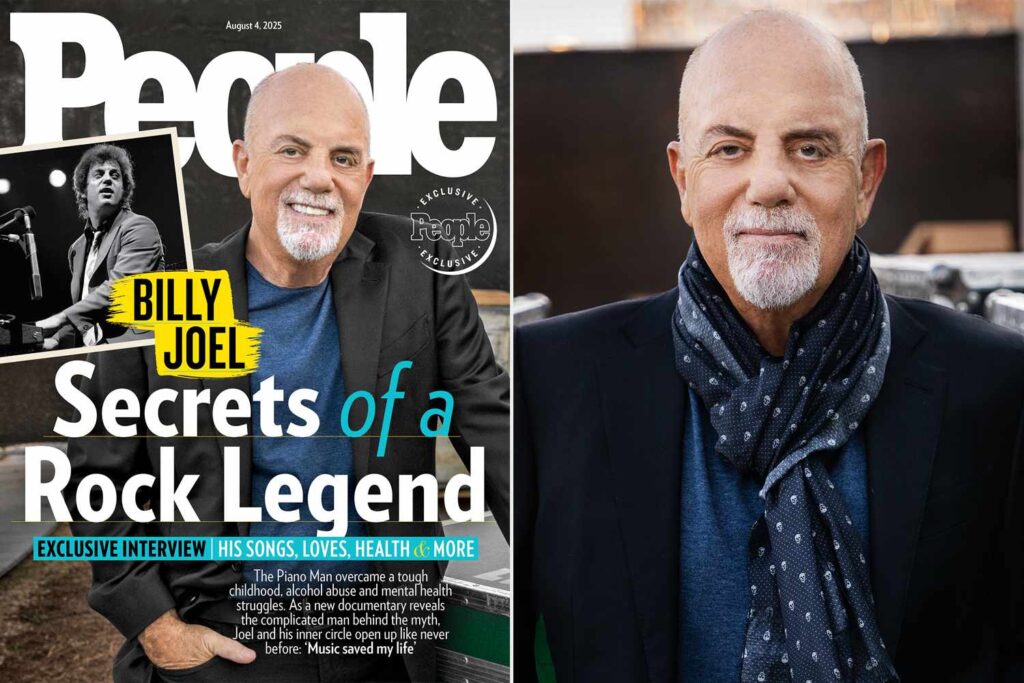NEED TO KNOW
Billy Joel likes to let his music do the talking. Take, for example, “Vienna,” a song about the legendary rocker’s complicated relationship with his late father Howard. Or his 1973 track “You’re My Home,” a romantic ode to his first wife, Elizabeth Weber.
Through a catalog of more than 120 songs, Joel, 76, has made expressing himself through music his forte. But speaking about the moments that shaped him? That’s a different story — one that, for the first time, is being told in a new two-part HBO documentary Billy Joel: And So It Goes (now streaming).
“I’ve resisted this kind of thing for so long. I’m sick of talking about myself,” Joel tells PEOPLE in an exclusive interview. “Some of the stupid stuff I did, that’s painful to talk about. [But] they asked me for some thematic guidance. I said, ‘Just tell the truth.’”
And so they did. The documentary, directed by Susan Lacy and Jessica Levin, is a rare, revelatory glimpse into the private world of one of rock music’s most enduring acts — and how he overcame substance abuse, mental health struggles and more to find peace and happiness with his wife, Alexis, and his three daughters.
Richard E. Aaron/Redferns/Getty
“There was some stuff I found out about myself. There was some self-revelatory stuff,” Joel explains, while Lacy adds: “He actually thanked me for connecting the dots of his life, and he said, ‘I now understand why I did what I did.’ I think it was a revelation to him in some ways as well, this story.”
Joel’s story of course includes his incredibly successful music career, throughout which he’s sold more than 150 million records and won five Grammy Awards thanks to hits like “Piano Man,” “Just the Way You Are” and “We Didn’t Start the Fire.” Though he hasn’t released a pop album in 32 years, Joel’s cultural relevance has never wavered, thanks in part to his epic, 10-year Madison Square Garden residency that ended in July 2024.
But the lesser-known aspects of the rocker’s life paint another picture, a compelling and sometimes tragic story that includes the painful absence of his father from much of his life, a complicated beginning to his marriage with first wife Elizabeth Weber (Weber was married to Joel’s friend and bandmate Jon Small when they first met), struggles over the years with alcohol abuse and a contentious relationship with the media.
Myrna Suarez
“My goal was to get it over with,” Joel says bluntly of his initial involvement in the film. “When I do interviews, people just ask you about yourself and you get a little self-conscious about it eventually. It’s almost embarrassing. When you’re talking about your personal life detached from the material… I suppose there’s a little bit of wariness involved.”
Take PEOPLE with you! Subscribe to PEOPLE magazine to get the latest details on celebrity news, exclusive royal updates, how-it-happened true crime stories and more — right to your mailbox.
Still, Joel opens up like never before in the film, which features interviews with members of his inner circle, including his sister Judy, daughter Alexa Ray, 39, and more, plus longtime friends like lighting designer Steve Cohen and booking agent Dennis Arfa.
Courtesy Billy Joel
“Billy has always been a blue-collar guy, a man of the people. He’s always been honest. He’s funny, he loves to entertain,” Cohen, an executive producer on the film, says of what it’s like to be friends with Joel behind the scenes. “I think all of that came through in the documentary. I didn’t see much of a difference between the Billy I know and interact with every day and the Billy in this film.”
That’s not to say that revisiting some of the most difficult moments of his life was easy for Joel. (His recent diagnosis of the treatable brain condition normal pressure hydrocephalus is not addressed in the film, though Joel tells PEOPLE he’s “okay” and “doing my best to work with it and recover from it”).
“You realize sometimes you were a jerk and you did something stupid or you were wrong, or you were mean and you didn’t mean to be. Although I always maintain that the only original thing any of us really does is make mistakes,” he says. “I was worried, maybe I’m going to hate this thing, because it’s a lot to ask of somebody, a lifetime of work. [But] at the end, I didn’t hate it, which, to me, is the real compliment.”
Dick Kraus/Newsday RM via Getty
The film is structured around Joel’s iconic song catalog, as he admits that much of his lyrics are autobiographical. “Big Shot,” he says, is a “hangover” song, while “I Go to Extremes” covers the ups and downs of his marriage to then-wife Christie Brinkley. “Vienna,” he explains, is about his father Howard, who left Joel, his mother Rosalind and sister Judy when the star was 8 years old, and eventually settled in the Austrian city, where Joel tracked him down years later.
“[Co-director] Susan Lacy pointed out that a lot of the things I was searching for were my father in my life, and I recognized that in the documentary,” Joel says. “I said, ‘You know what? I think that’s true. I was looking for my dad.’”
Though Joel announced he’d be all but retiring from performing and public life in 2011 — “He lost his will,” says booking agent Arfa. “He was at a very low point” — the entertainer enjoyed a career resurgence in 2014 when he launched his Madison Square Garden residency, which wound up lasting a decade.
Alamy
“I’m so grateful for the support we’ve had from people who come to see us. It’s staggering to me. And a lot of it I don’t even understand, but I don’t question it. It’s a blessing in my life,” he says. “I think it’s the communal aspect of it. When everybody is really enjoying what you’re doing and they’re singing along and going along with you and they’re rooting for you, it’s almost like a Woodstock experience.”
Cohen emphasizes that his longtime pal’s commitment to the craft is what fuels him.
“That’s been a work ethic through line in Billy’s life,” Cohen says. “You make mistakes. He always said to me, ‘You show up. You do the best you can. You admit when you’re wrong and you let other people tell you how good you are. You don’t tell yourself how good you are.’”
“I hope fans walk away realizing how f—ing human he is, and I hope they come back listening to these songs again with a deeper affection,” Cohen adds. “I hope that you walk away from this thing going, ‘I now justify my fandom. I know why this guy is as good and why I respond to it, because that’s the kind of guy I can relate to his life. I can relate to those emotions.'”

